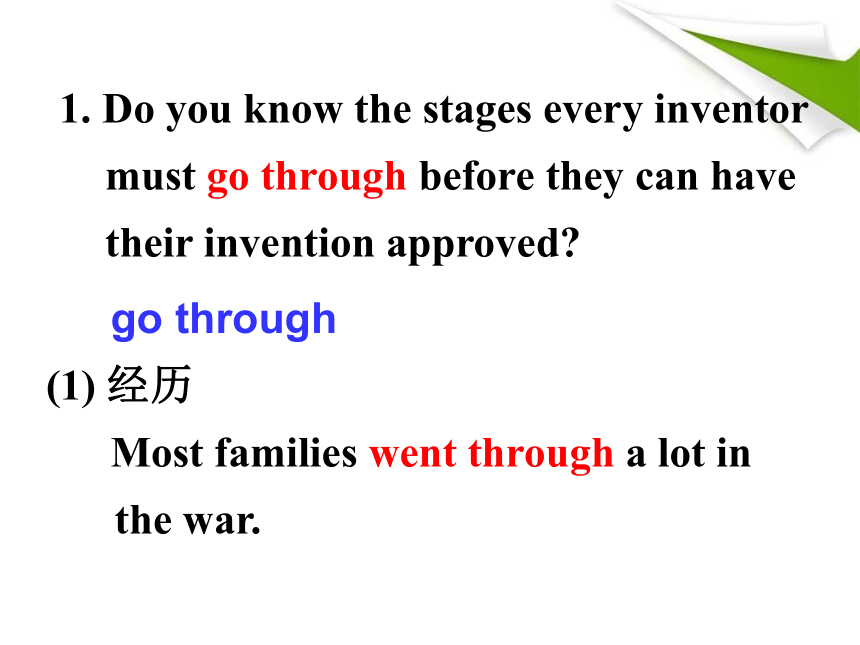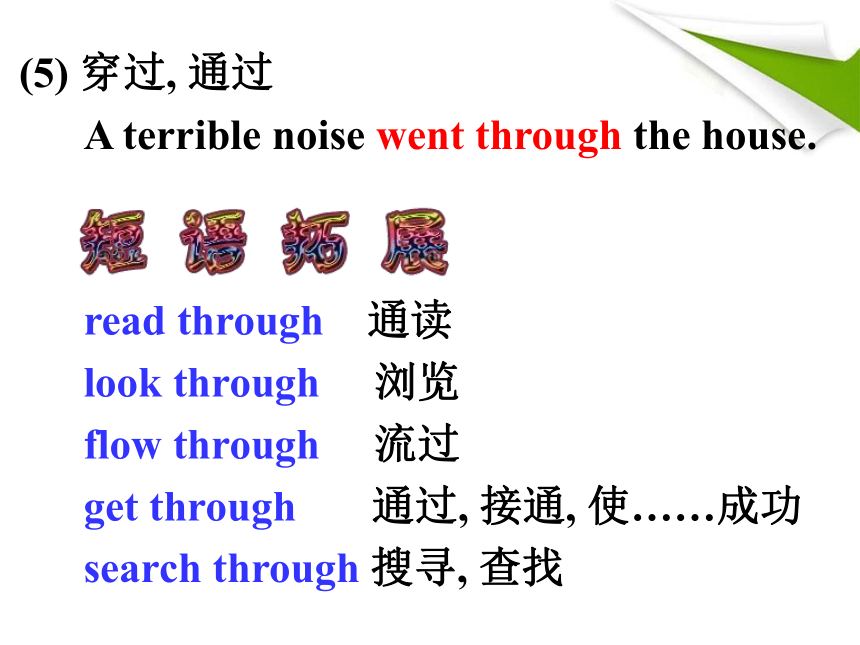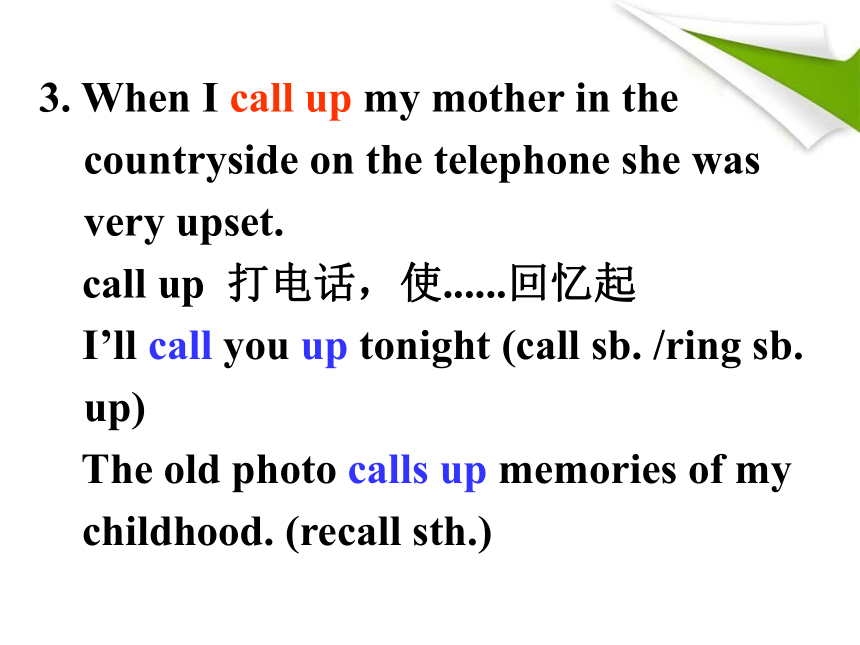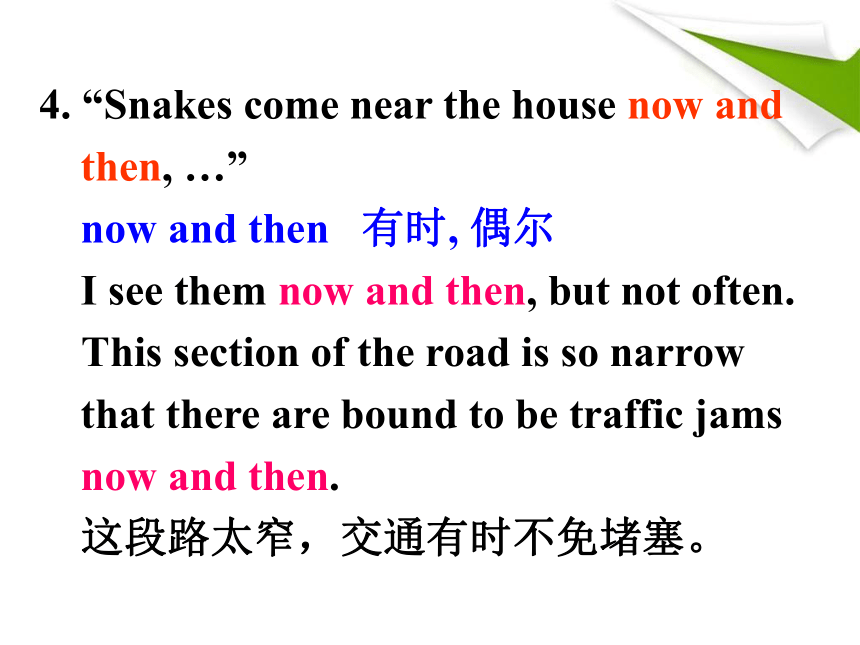人教版(新课程标准)选修8 Unit 3Inventors and inventions Language-points课件(60张ppt)
文档属性
| 名称 | 人教版(新课程标准)选修8 Unit 3Inventors and inventions Language-points课件(60张ppt) |

|
|
| 格式 | ppt | ||
| 文件大小 | 2.3MB | ||
| 资源类型 | 教案 | ||
| 版本资源 | 人教版(新课程标准) | ||
| 科目 | 英语 | ||
| 更新时间 | 2021-09-19 18:48:10 | ||
图片预览












文档简介
(共60张PPT)
人教课标
高二
选修
8
Unit
3
go
through
(1)
经历
Most
families
went
through
a
lot
in
the
war.
1.
Do
you
know
the
stages
every
inventor
must
go
through
before
they
can
have
their
invention
approved?
(2)
通过,
成功,
成交
The
plan
did
not
go
through.
(3)
审阅,
检查
I
can’t
go
though
the
letters
in
an
hour.
(4)
翻找,
查看
Mother
went
through
the
drawer
for
her
glasses.
(5)
穿过,
通过
A
terrible
noise
went
through
the
house.
read
through
通读
look
through
浏览
flow
through
流过
get
through
通过,
接通,
使……成功
search
through
搜寻,
查找
2.
do
research
on
/into
/in
...
从事,
进行,
做研究
They
are
carrying
out
a
research
into
the
causes
of
cancer.
research
可作可数名词和不可数名词,
有自己的单复数形式。短语
do
research
中
research
为不可数名词。
3.
When
I
call
up
my
mother
in
the
countryside
on
the
telephone
she
was
very
upset.
call
up
打电话,使......回忆起
I’ll
call
you
up
tonight
(call
sb.
/ring
sb.
up)
The
old
photo
calls
up
memories
of
my
childhood.
(recall
sth.)
call
for
需要,
要求
call
back
回电话,召唤某人回来
call
in
邀请,
请来
call
off
取消;停止
call
on/at
拜访
(call
on后跟人作宾语,call
at后跟地点名词作宾语)
call
at
drop
in
at
pay
a
visit
to
go
on
a
visit
to
visit
拜访某地
+
sp.
拜访某人
+
sb.
call
on
drop
in
on
pay
a
visit
to
go
on
a
visit
to
visit
选用以上短语的适当形式填空。
1.
They
__________
their
plan
for
a
picnic
because
of
the
bad
weather.
2.
I
hope
to
________
you
at
your
office
at
three
o’clock
today.
3.
The
photos
_________
memories
of
my
study
in
Beijing.
called
off
call
on
called
up
4.
“Snakes
come
near
the
house
now
and
then,
…”
now
and
then
有时,
偶尔
I
see
them
now
and
then,
but
not
often.
This
section
of
the
road
is
so
narrow
that
there
are
bound
to
be
traffic
jams
now
and
then.
这段路太窄,交通有时不免堵塞。
I
used
to
call
people
________,
from
the
moment
I
woke
up
to
the
time
I
went
to
sleep.
A.
now
and
then
B.
all
the
time
C.
at
home
D.
at
work
from
time
to
time
有时;
不时
(every)
now
and
again
时而;
不时
from
now
on
从现在开始,
今后
just
now
刚才
since
then
从那时以来
5.
Here
was
a
chance
for
me
to
distinguish
myself
by
inventing
something
merciful
that
would
catch
snakes
but
not
harm
them.
这回我有机会表现一下自己了,我要发明某种仁慈的东西,既能捉住蛇,又不会伤害它们。
distinguish
v.
辨别,
区别
I
can’t
distinguish
the
twins,
they
are
so
alike.
Can
you
distinguish
between
those
two
objects?
你能区分那两个物体吗?
Children
should
be
taught
to
distinguish
right
from
wrong.
应当教育孩子分辨好坏。
distinguish
…
from
把…...与……分开
=
distinguish
between
…
and
…
distinguish
oneself
显扬自己,
使自己扬名
He’s
distinguished
himself
as
a
teacher.
作为老师,他早已负有盛名。
The
man
distinguish
himself
by
his
wisdom.
这个人因智慧而扬名。
distinction
n.
区别,
差异
distinctive
adj.
有特色的,
与众不同的
distinct
adj.
截然不同的
distinguishable
adj.
区别得出的,
辨认得出的
tell
the
differences
between
…
and
…
=
tell
…
from
…
把......与......区分开
6.
I
set
about
researching
the
habits
of
snakes
to
find
the
easiest
way
to
trap
them.
1)
set
about
开始,着手,后接名词或动词
-ing形式,即set
about
(doing)
sth.。如:
You
must
set
about
your
work
at
once.
Gathering
up
the
thread
of
his
story,
he
set
about
writing.
两者都表示“着手,开始”时,set
about
后跟名词或动词
-ing
形式,set
out
后跟动词不定式。如:
1.
Jack
set
about
decorating
their
new
house
in
blues
and
yellows.
2.
The
journalist
immediately
set
out
to
obtain
these
important
facts.
set
about
&
set
out
set
aside
为……节省或保留(钱或时间);将……放在一边
set
out
to
do
sth.开始做某事
set
out
(for)
出发,
启程
set
off
(for)
=
leave
for出发,
动身;
使爆炸
set
aside
留出,
对…不予以考虑
set
down
记下,
写下;
登记
set
up
设置,
造成,
产生
选用以上短语的适当形式填空。
1.
When
I
really
________
to
take
care
of
somebody,
I
usually
do
the
job
properly.
2.
Do
you
know
how
to
_________
going
on
with
this
work?
set
out
set
about
On
receiving
the
assignment,
we___
at
once.
A.
set
to
work
B.
set
out
to
work
C.
get
down
to
work
D.
all
the
above
2)
habit:
out
of
habit
出于习惯
be
in
the
habit
有…...的习惯
break
the
habit
改掉…...的习惯
develop/form
the
habit
of
养成…...习惯
habit,
custom,
practice
habit
通常指个人经常行为。
custom
一般指整个社会在一段时间里的行为、风俗。
practice
指惯例,
也指商业或者法律上的常规做法。
7.
They
abruptly
disappeared
into
a
convenient
hole
in
the
wall.
它们突然一下子就消失在墙壁附近的洞里去了。
[考点
1]
abruptly
adv.
突然地,
唐突地,
意外地,
比
suddenly
的意外程度强。
abrupt
adj.
突然的;意外的
1.
这路有很多急转弯。
The
road
is
full
of
____________.
2.
这会议突然结束了。
The
meeting
came
to
______________.
3.
我们的讨论突然给缩短了。
Our
discussion
was
________
curtailed.
abrupt
turns
an
abrupt
end
abruptly
[考点2]
convenient
便利的;方便的
可构成
it
is
convenient
to
/
for
sb.
和
it
is
convenient
for
sb.
to
do
sth.
结构,意为:对某人来说(做某事)是方便的。
警示:
convenient
不能以人作主语。
This
dishwasher
is
very
convenient
to
me.
Will
it
be
convenient
for
you
to
start
work
tomorrow?
It’s
convenient
to
have
a
supermarket
nearby.
If
it
is
quite
______
to
you,
I
will
visit
you
next
Tuesday.
A.
convenient
B.
fair
C.
easy
D.
comfortable
[点拨]
If
it
is
quite
convenient
to
you如果对你来说很方便的话。fair
公平的;easy
容易的;comfortable
舒服的。
Would
it
be
____________
for
you
to
pick
me
up
at
four
o’
clock
and
take
me
to
the
airport?
A.
free
B.
vacant
C.
handy
D.
convenient
[点拨]
由题意“你四点钟来接我并送我去机场,方便吗?”和结构
it
be
convenient
for
sb.
to
do
sth.
可知选
D。
free
自由的,空闲的,免费的;vacant
空着的,空缺的;handy
手边的,便于使用的。
根据括号内的汉语提示完成下列句子。
He
asked
_________________________
_________________________
(我们什么
时候方便参观这家工厂).
2.
Come
whenever
___________________
(对你来说是方便的).
when
it
would
be
convenient
for
us
to
visit
the
factory
it
is
convenient
to
you
3.
I
will
call
back
______________________
(在更方便的时候).
4.
We
bought
this
house
______________
(为方便起见);
it’s
near
the
shops
and
the
railway
station.
at
a
more
convenient
time
for
convenience
8.
Pressed
by
my
friends
and
relations,
I
decided
to
seize
the
opportunity
to
get
recognition
for
my
successful
idea
by
sending
my
invention
to
the
patent
office.
由于朋友和亲戚的敦促,我决定抓住
这次机会把我的发明送到专利局去,
请他们对我这次成功的思路给予认可。
seize
阅读下列句子,观察
seize
在句中的
意思。
1.
Seize
the
day,
seize
the
hour.
2.
He
seized
me
by
the
hand
and
dragged
me
from
the
window.
抓住(时间、机会等)
抓住,捉住
用
seize
的适当形式填空。
1.
The
host
_______
my
hand
and
shook
it
heartily.
2.
We
must
_______
every
chance
to
practice
speaking
English.
3.
The
soldiers
seized
the
city
after
a
hard
fight.
夺取,攻占
seized
seize
1.
The
first
thing
I
did
was
to
see
if
there
were
any
products
that
might
help
me,
but
there
only
seemed
to
be
powders
designed
to
kill
snakes.
[分析]
a.
本句是一个由but连接的并列句。
b.
第一个分句中,I
did
是省略了关系代词
that
的定语从句;在
if
引导的
宾语从句中又有个由
that
引导的定语从句,修饰
products。
c.
第二个分句中,
designed
to
...
是过去分词短语作后置定语,修饰________。
powders
Five
people
won
the
“China’s
Green
Figure”
award,
a
title
________
to
ordinary
people
for
their
contributions
to
environmental
protection.
A.
being
given
B.
is
given
C.
given
D.
was
given
[点拨]
由逗号之前是一个完整的句子和
逗号之后无连接词,
可知逗号后面不是
一个句子,
排除B、D;
而
give
与
a
title
之间构成逻辑上的动宾关系,
故选C。
2.
Between
the
outside
and
the
inside
walls
of
the
bowl
there
is
some
jelly,
which
freezes
when
cooled.
[分析]
a.
本句的主干是:there
is
some
jelly。
b.
which引导非限制性定语从句,其中
which指代先行词
_____,
并在从句中
作主语。
jelly
c.
when
cooled是“连词
+
分词”形式,
是一种省略,完整的表达是
when
it
is
cooled。英语中,如果状语从句中
的主语与主句的主语相同,谓语动词
是be
时,则常可省略成“连词
+
分
词”形式。“连词
+
动词-ing形式”表
示主动;“连词
+
过去分词”表示被
动。
3.
Only
after
you
have
had
that
recognition
can
you
say
that
you
are
truly
an
inventor.
只有你得到这种承认,
你才能说你是真
正的一个发明家。
only
修饰状语置于句首,主句需用倒
装语序。
Only
by
working
hard
can
we
pass
the
exams.
4.
Nor
will
you
receive
a
patent
until
a
search
has
made
to
find
out
that
your
product
really
is
different
from
everyone
else’s.
你的产品要经过仔细调查,
证明它确实与众不同,
你才能获得专利。
a.
本句的主句
Nor
will
you
receive
a
patent
是个倒装句,nor
位于句首
时,句子用倒装。
b.
从句是
until
引导的时间状语从句。
c.
时间状语从句中包含一个由
that
引
导的宾语从句,作
find
out
的宾
语。
如果你决定不参加会议,我也不参加。
________________________________
________________________________
If
you
decide
not
to
attend
the
meeting,
nor
will
I.
5.
In
Japan
scientists
have
managed
to
produce
pigs
that
have
a
plant
gene
inserted
into
their
DNA.
[考点]
inserted
into
their
DNA
是过去分词
短语作宾语补足语。
Jenny
hopes
that
Mr.
Smith
will
suggest
a
good
way
to
have
her
written
English
_______
in
a
short
period.
A.
improved
B.
improving
C.
to
improve
D.
improve
[点拨]
improve
与her
written
English之间构成逻辑上的动宾关系,要用过去分词作宾语补足语。
6.
The
criteria
are
so
strict
that
it
is
difficult
to
get
new
ideas
accepted
unless
they
are
truly
novel.
[分析]
a.
本句的主句是The
criteria
are
so
strict,
从句是that引导的结果状语从句。
b.
从句中it是形式主语,真正的主语是
______________________;
该从句中还
有一个由unless引导的条件状语从句。
to
get
new
ideas
accepted
1.
I
am
writing
to
you
in
connection
with
your
job
__________
(apply).
2.
What
are
the
_______
(criterion)
of
being
an
emergency
nurse?
I.
用所给词的适当形式填空。
application
criteria
3.
If
you
would
give
me
another
chance,
I
believe
I
can
come
up
to
your
__________
(expect).
4.
Will
it
be
__________
(convenience)
for
you
to
start
working
tomorrow?
5.
“It
won’t
work,”
Mitchell
said
________
(abrupt),
in
a
no-nonsense
style.
convenient
abruptly
expectation
II.
每空填一词,
使该句与所给句子的意思相同或相近。
1.
Not
receiving
any
letter
from
him,
I
gave
him
a
call.
Not
receiving
any
letter
from
him,
I
_____
____
___.
called
him
up
2.
The
shepherd
set
out
to
look
for
the
sheep
that
had
wandered
away.
The
shepherd
___
_____
_______
___
the
sheep
that
had
wandered
away.
3.
It
seems
that
he
has
read
this
book.
He
seems
to
____
____
this
book.
set
about
looking
for
have
read
4.
He
went
to
see
his
grandmother
sometimes.
He
went
to
see
his
grandmother
____
___
____.
5.
He
was
able
to
walk
without
sticks
only
one
day
after
the
operation.
____
___
___
_____
___
_________
____
he
able
to
walk
without
sticks.
now
and
then
operation
Only
one
day
after
the
was
6.
He
will
not
agree
to
this
plan,
and
he
will
not
support
anyone
who
does
either.
He
will
not
agree
to
this
plan,
____
___
___
support
anyone
who
does.
nor
will
he
III.
用方框内所给短语的适当形式填空。
a
matter
of
get
down
to
in
case
call
up
in
addition
to
get
rid
of
1.
How
can
you
________
a
bad
habit?
2.
He
had
his
camera
ready,
just
______
he
saw
something
that
would
make
a
good
picture.
get
rid
of
in
case
3.
____________
your
car
payment,
you
will
have
to
pay
for
annual
insurance.
4.
I’m
sure
we
will
succeed
in
time
if
we
keep
on
trying.
It’s
just
___________
time.
5.
I
must
__________
study
tonight,
as
I’m
going
to
take
an
exam
tomorrow.
6.
She
________
a
friend
just
for
a
chat.
In
addition
to
a
matter
of
get
down
to
called
up
IV.
根据括号内的提示将下列句子翻译成英语。
1.
他开始说服我接受他的想法。(set
about)
He
set
about
persuading
me
to
accept
his
ideas.
2.
可能会下雨,你最好把伞带上以防万一。(in
case)
3.
我今天不方便去逛街。(convenient)
It
may
rain
—
you’d
better
take
an
umbrella
in
case.
It’s
not
convenient
for
me
to
go
shopping
today.
人教课标
高二
选修
8
Unit
3
go
through
(1)
经历
Most
families
went
through
a
lot
in
the
war.
1.
Do
you
know
the
stages
every
inventor
must
go
through
before
they
can
have
their
invention
approved?
(2)
通过,
成功,
成交
The
plan
did
not
go
through.
(3)
审阅,
检查
I
can’t
go
though
the
letters
in
an
hour.
(4)
翻找,
查看
Mother
went
through
the
drawer
for
her
glasses.
(5)
穿过,
通过
A
terrible
noise
went
through
the
house.
read
through
通读
look
through
浏览
flow
through
流过
get
through
通过,
接通,
使……成功
search
through
搜寻,
查找
2.
do
research
on
/into
/in
...
从事,
进行,
做研究
They
are
carrying
out
a
research
into
the
causes
of
cancer.
research
可作可数名词和不可数名词,
有自己的单复数形式。短语
do
research
中
research
为不可数名词。
3.
When
I
call
up
my
mother
in
the
countryside
on
the
telephone
she
was
very
upset.
call
up
打电话,使......回忆起
I’ll
call
you
up
tonight
(call
sb.
/ring
sb.
up)
The
old
photo
calls
up
memories
of
my
childhood.
(recall
sth.)
call
for
需要,
要求
call
back
回电话,召唤某人回来
call
in
邀请,
请来
call
off
取消;停止
call
on/at
拜访
(call
on后跟人作宾语,call
at后跟地点名词作宾语)
call
at
drop
in
at
pay
a
visit
to
go
on
a
visit
to
visit
拜访某地
+
sp.
拜访某人
+
sb.
call
on
drop
in
on
pay
a
visit
to
go
on
a
visit
to
visit
选用以上短语的适当形式填空。
1.
They
__________
their
plan
for
a
picnic
because
of
the
bad
weather.
2.
I
hope
to
________
you
at
your
office
at
three
o’clock
today.
3.
The
photos
_________
memories
of
my
study
in
Beijing.
called
off
call
on
called
up
4.
“Snakes
come
near
the
house
now
and
then,
…”
now
and
then
有时,
偶尔
I
see
them
now
and
then,
but
not
often.
This
section
of
the
road
is
so
narrow
that
there
are
bound
to
be
traffic
jams
now
and
then.
这段路太窄,交通有时不免堵塞。
I
used
to
call
people
________,
from
the
moment
I
woke
up
to
the
time
I
went
to
sleep.
A.
now
and
then
B.
all
the
time
C.
at
home
D.
at
work
from
time
to
time
有时;
不时
(every)
now
and
again
时而;
不时
from
now
on
从现在开始,
今后
just
now
刚才
since
then
从那时以来
5.
Here
was
a
chance
for
me
to
distinguish
myself
by
inventing
something
merciful
that
would
catch
snakes
but
not
harm
them.
这回我有机会表现一下自己了,我要发明某种仁慈的东西,既能捉住蛇,又不会伤害它们。
distinguish
v.
辨别,
区别
I
can’t
distinguish
the
twins,
they
are
so
alike.
Can
you
distinguish
between
those
two
objects?
你能区分那两个物体吗?
Children
should
be
taught
to
distinguish
right
from
wrong.
应当教育孩子分辨好坏。
distinguish
…
from
把…...与……分开
=
distinguish
between
…
and
…
distinguish
oneself
显扬自己,
使自己扬名
He’s
distinguished
himself
as
a
teacher.
作为老师,他早已负有盛名。
The
man
distinguish
himself
by
his
wisdom.
这个人因智慧而扬名。
distinction
n.
区别,
差异
distinctive
adj.
有特色的,
与众不同的
distinct
adj.
截然不同的
distinguishable
adj.
区别得出的,
辨认得出的
tell
the
differences
between
…
and
…
=
tell
…
from
…
把......与......区分开
6.
I
set
about
researching
the
habits
of
snakes
to
find
the
easiest
way
to
trap
them.
1)
set
about
开始,着手,后接名词或动词
-ing形式,即set
about
(doing)
sth.。如:
You
must
set
about
your
work
at
once.
Gathering
up
the
thread
of
his
story,
he
set
about
writing.
两者都表示“着手,开始”时,set
about
后跟名词或动词
-ing
形式,set
out
后跟动词不定式。如:
1.
Jack
set
about
decorating
their
new
house
in
blues
and
yellows.
2.
The
journalist
immediately
set
out
to
obtain
these
important
facts.
set
about
&
set
out
set
aside
为……节省或保留(钱或时间);将……放在一边
set
out
to
do
sth.开始做某事
set
out
(for)
出发,
启程
set
off
(for)
=
leave
for出发,
动身;
使爆炸
set
aside
留出,
对…不予以考虑
set
down
记下,
写下;
登记
set
up
设置,
造成,
产生
选用以上短语的适当形式填空。
1.
When
I
really
________
to
take
care
of
somebody,
I
usually
do
the
job
properly.
2.
Do
you
know
how
to
_________
going
on
with
this
work?
set
out
set
about
On
receiving
the
assignment,
we___
at
once.
A.
set
to
work
B.
set
out
to
work
C.
get
down
to
work
D.
all
the
above
2)
habit:
out
of
habit
出于习惯
be
in
the
habit
有…...的习惯
break
the
habit
改掉…...的习惯
develop/form
the
habit
of
养成…...习惯
habit,
custom,
practice
habit
通常指个人经常行为。
custom
一般指整个社会在一段时间里的行为、风俗。
practice
指惯例,
也指商业或者法律上的常规做法。
7.
They
abruptly
disappeared
into
a
convenient
hole
in
the
wall.
它们突然一下子就消失在墙壁附近的洞里去了。
[考点
1]
abruptly
adv.
突然地,
唐突地,
意外地,
比
suddenly
的意外程度强。
abrupt
adj.
突然的;意外的
1.
这路有很多急转弯。
The
road
is
full
of
____________.
2.
这会议突然结束了。
The
meeting
came
to
______________.
3.
我们的讨论突然给缩短了。
Our
discussion
was
________
curtailed.
abrupt
turns
an
abrupt
end
abruptly
[考点2]
convenient
便利的;方便的
可构成
it
is
convenient
to
/
for
sb.
和
it
is
convenient
for
sb.
to
do
sth.
结构,意为:对某人来说(做某事)是方便的。
警示:
convenient
不能以人作主语。
This
dishwasher
is
very
convenient
to
me.
Will
it
be
convenient
for
you
to
start
work
tomorrow?
It’s
convenient
to
have
a
supermarket
nearby.
If
it
is
quite
______
to
you,
I
will
visit
you
next
Tuesday.
A.
convenient
B.
fair
C.
easy
D.
comfortable
[点拨]
If
it
is
quite
convenient
to
you如果对你来说很方便的话。fair
公平的;easy
容易的;comfortable
舒服的。
Would
it
be
____________
for
you
to
pick
me
up
at
four
o’
clock
and
take
me
to
the
airport?
A.
free
B.
vacant
C.
handy
D.
convenient
[点拨]
由题意“你四点钟来接我并送我去机场,方便吗?”和结构
it
be
convenient
for
sb.
to
do
sth.
可知选
D。
free
自由的,空闲的,免费的;vacant
空着的,空缺的;handy
手边的,便于使用的。
根据括号内的汉语提示完成下列句子。
He
asked
_________________________
_________________________
(我们什么
时候方便参观这家工厂).
2.
Come
whenever
___________________
(对你来说是方便的).
when
it
would
be
convenient
for
us
to
visit
the
factory
it
is
convenient
to
you
3.
I
will
call
back
______________________
(在更方便的时候).
4.
We
bought
this
house
______________
(为方便起见);
it’s
near
the
shops
and
the
railway
station.
at
a
more
convenient
time
for
convenience
8.
Pressed
by
my
friends
and
relations,
I
decided
to
seize
the
opportunity
to
get
recognition
for
my
successful
idea
by
sending
my
invention
to
the
patent
office.
由于朋友和亲戚的敦促,我决定抓住
这次机会把我的发明送到专利局去,
请他们对我这次成功的思路给予认可。
seize
阅读下列句子,观察
seize
在句中的
意思。
1.
Seize
the
day,
seize
the
hour.
2.
He
seized
me
by
the
hand
and
dragged
me
from
the
window.
抓住(时间、机会等)
抓住,捉住
用
seize
的适当形式填空。
1.
The
host
_______
my
hand
and
shook
it
heartily.
2.
We
must
_______
every
chance
to
practice
speaking
English.
3.
The
soldiers
seized
the
city
after
a
hard
fight.
夺取,攻占
seized
seize
1.
The
first
thing
I
did
was
to
see
if
there
were
any
products
that
might
help
me,
but
there
only
seemed
to
be
powders
designed
to
kill
snakes.
[分析]
a.
本句是一个由but连接的并列句。
b.
第一个分句中,I
did
是省略了关系代词
that
的定语从句;在
if
引导的
宾语从句中又有个由
that
引导的定语从句,修饰
products。
c.
第二个分句中,
designed
to
...
是过去分词短语作后置定语,修饰________。
powders
Five
people
won
the
“China’s
Green
Figure”
award,
a
title
________
to
ordinary
people
for
their
contributions
to
environmental
protection.
A.
being
given
B.
is
given
C.
given
D.
was
given
[点拨]
由逗号之前是一个完整的句子和
逗号之后无连接词,
可知逗号后面不是
一个句子,
排除B、D;
而
give
与
a
title
之间构成逻辑上的动宾关系,
故选C。
2.
Between
the
outside
and
the
inside
walls
of
the
bowl
there
is
some
jelly,
which
freezes
when
cooled.
[分析]
a.
本句的主干是:there
is
some
jelly。
b.
which引导非限制性定语从句,其中
which指代先行词
_____,
并在从句中
作主语。
jelly
c.
when
cooled是“连词
+
分词”形式,
是一种省略,完整的表达是
when
it
is
cooled。英语中,如果状语从句中
的主语与主句的主语相同,谓语动词
是be
时,则常可省略成“连词
+
分
词”形式。“连词
+
动词-ing形式”表
示主动;“连词
+
过去分词”表示被
动。
3.
Only
after
you
have
had
that
recognition
can
you
say
that
you
are
truly
an
inventor.
只有你得到这种承认,
你才能说你是真
正的一个发明家。
only
修饰状语置于句首,主句需用倒
装语序。
Only
by
working
hard
can
we
pass
the
exams.
4.
Nor
will
you
receive
a
patent
until
a
search
has
made
to
find
out
that
your
product
really
is
different
from
everyone
else’s.
你的产品要经过仔细调查,
证明它确实与众不同,
你才能获得专利。
a.
本句的主句
Nor
will
you
receive
a
patent
是个倒装句,nor
位于句首
时,句子用倒装。
b.
从句是
until
引导的时间状语从句。
c.
时间状语从句中包含一个由
that
引
导的宾语从句,作
find
out
的宾
语。
如果你决定不参加会议,我也不参加。
________________________________
________________________________
If
you
decide
not
to
attend
the
meeting,
nor
will
I.
5.
In
Japan
scientists
have
managed
to
produce
pigs
that
have
a
plant
gene
inserted
into
their
DNA.
[考点]
inserted
into
their
DNA
是过去分词
短语作宾语补足语。
Jenny
hopes
that
Mr.
Smith
will
suggest
a
good
way
to
have
her
written
English
_______
in
a
short
period.
A.
improved
B.
improving
C.
to
improve
D.
improve
[点拨]
improve
与her
written
English之间构成逻辑上的动宾关系,要用过去分词作宾语补足语。
6.
The
criteria
are
so
strict
that
it
is
difficult
to
get
new
ideas
accepted
unless
they
are
truly
novel.
[分析]
a.
本句的主句是The
criteria
are
so
strict,
从句是that引导的结果状语从句。
b.
从句中it是形式主语,真正的主语是
______________________;
该从句中还
有一个由unless引导的条件状语从句。
to
get
new
ideas
accepted
1.
I
am
writing
to
you
in
connection
with
your
job
__________
(apply).
2.
What
are
the
_______
(criterion)
of
being
an
emergency
nurse?
I.
用所给词的适当形式填空。
application
criteria
3.
If
you
would
give
me
another
chance,
I
believe
I
can
come
up
to
your
__________
(expect).
4.
Will
it
be
__________
(convenience)
for
you
to
start
working
tomorrow?
5.
“It
won’t
work,”
Mitchell
said
________
(abrupt),
in
a
no-nonsense
style.
convenient
abruptly
expectation
II.
每空填一词,
使该句与所给句子的意思相同或相近。
1.
Not
receiving
any
letter
from
him,
I
gave
him
a
call.
Not
receiving
any
letter
from
him,
I
_____
____
___.
called
him
up
2.
The
shepherd
set
out
to
look
for
the
sheep
that
had
wandered
away.
The
shepherd
___
_____
_______
___
the
sheep
that
had
wandered
away.
3.
It
seems
that
he
has
read
this
book.
He
seems
to
____
____
this
book.
set
about
looking
for
have
read
4.
He
went
to
see
his
grandmother
sometimes.
He
went
to
see
his
grandmother
____
___
____.
5.
He
was
able
to
walk
without
sticks
only
one
day
after
the
operation.
____
___
___
_____
___
_________
____
he
able
to
walk
without
sticks.
now
and
then
operation
Only
one
day
after
the
was
6.
He
will
not
agree
to
this
plan,
and
he
will
not
support
anyone
who
does
either.
He
will
not
agree
to
this
plan,
____
___
___
support
anyone
who
does.
nor
will
he
III.
用方框内所给短语的适当形式填空。
a
matter
of
get
down
to
in
case
call
up
in
addition
to
get
rid
of
1.
How
can
you
________
a
bad
habit?
2.
He
had
his
camera
ready,
just
______
he
saw
something
that
would
make
a
good
picture.
get
rid
of
in
case
3.
____________
your
car
payment,
you
will
have
to
pay
for
annual
insurance.
4.
I’m
sure
we
will
succeed
in
time
if
we
keep
on
trying.
It’s
just
___________
time.
5.
I
must
__________
study
tonight,
as
I’m
going
to
take
an
exam
tomorrow.
6.
She
________
a
friend
just
for
a
chat.
In
addition
to
a
matter
of
get
down
to
called
up
IV.
根据括号内的提示将下列句子翻译成英语。
1.
他开始说服我接受他的想法。(set
about)
He
set
about
persuading
me
to
accept
his
ideas.
2.
可能会下雨,你最好把伞带上以防万一。(in
case)
3.
我今天不方便去逛街。(convenient)
It
may
rain
—
you’d
better
take
an
umbrella
in
case.
It’s
not
convenient
for
me
to
go
shopping
today.
